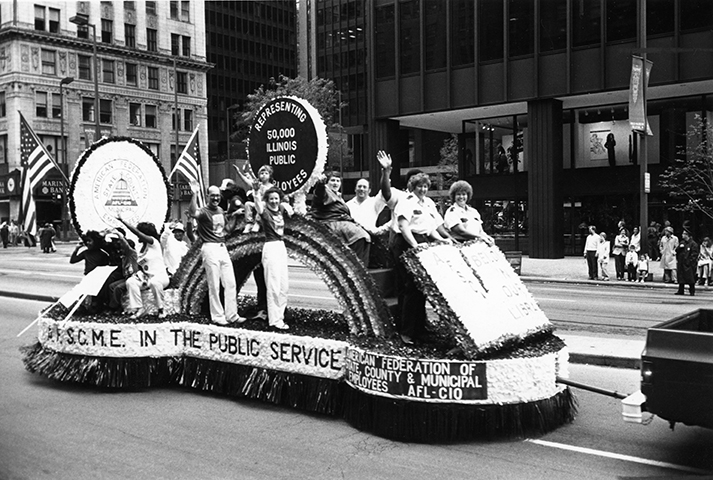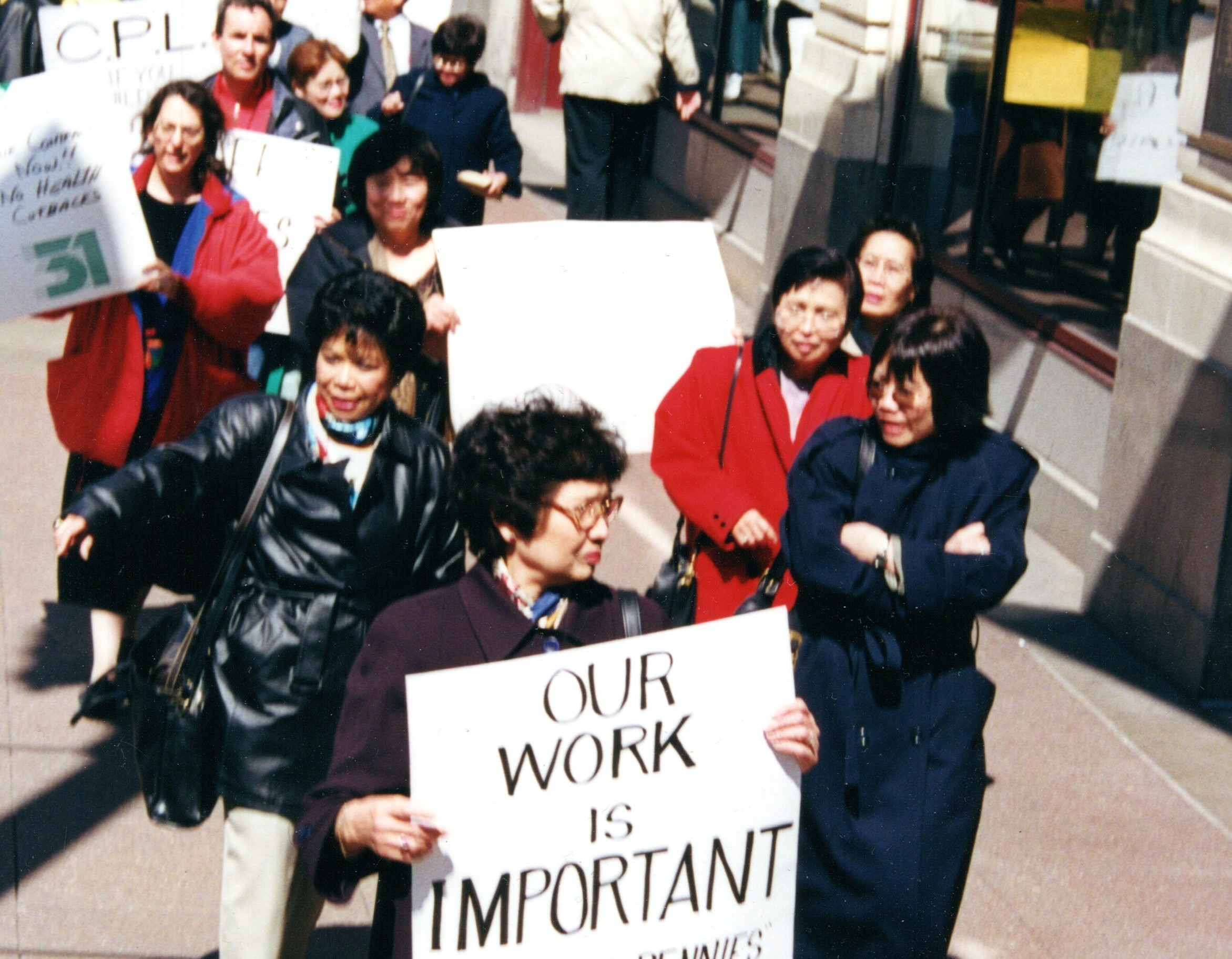History
1937
October 31. A group of 13 activists employed by Chicago Public Library (CPL) initiate a labor organizing campaign. The effort is led by Abram “Abe” Korman, who later becomes the president of CPL’s first employee union: Local 88, organized for the newly created Committee for Industrial Organization (CIO) and the State, County, and Municipal Workers of America (SCMWA). Local 88’s initial main goal is to strengthen civil service practices within CPL. Its major directives include “the good of the library itself, and the well-being of the library employees, individually and collectively.” To achieve these goals, the Local fights for adequate staffing, an increase in the minimum wage for full- and part-time employees, a 35-hour workweek, and safe working conditions.

1938
December. One of Local 88’s first actions is to demand a minimum salary of $100 per month and an increase of $20 per month for all full-time employees. The demands make it to the Mayor’s desk in 1939, but the Library Board rejects them.

1939
October. Local 88 organizes a citywide rally in protest of Hitler and fascism.
1944
February. Local 88 advocates for legislation against poll taxes, which prevented some African-Americans from voting. The Local also distributes a pamphlet titled “We Hold These Truths,” as a part of an ongoing effort to educate non-Black union members about important issues in civil rights.
1949
September. Local 88 becomes Local 1215, due to the formation of the Government and Civic Employees Organizing Committee, “the CIO successor to United Public Workers.”
1956
Local 1215 finalizes the move into AFSCME.

1967
March. Local 1215 threatens a strike over the right to represent its members in the processing of grievances, and the right to submit suggestions for improvement in personnel practices. An agreement is reached between the union, Mayor Daley and library officials.
1972
September. The Coalition of Black Trade Unionists (CBTU) hosts its inaugural convention in Chicago.
1973
Illinois Governor Daniel Walker agrees to grant state, county, and city employees the right to unionize. This results in the formation of AFSCME Illinois Council 31.

1982
November. Local 1215 asserts that Mayor Jane Byrne’s administration is widening the wage gap between men and women. Twenty city employees, including library workers, file discrimination charges against Mayor Byrne’s administration through the Equal Employment Opportunity Commission.

1985
December 13. Mayor Harold Washington signs the City of Chicago’s first collective bargaining contract with AFSCME. The historic contract included a 5% pay increase for 3,500 employees, mostly women.

1987
September. Chicago’s first Labor Day Parade in four decades is a massive success, and includes a float from AFSCME Council 31 with Local 1215 represented.


1999
Local 1215 attends the CBTU Convention in New Orleans, publicly supporting the right of Avondale Metal Company workers to organize.

2012
January. After petitioning for several months and gaining thousands of signatures, Local 1215 files a grievance against Mayor Rahm Emanual’s decision to reduce hours and lay off 176 library workers.
2020
May. Library workers fight Mayor Lori Lightfoot’s decision to reopen all Chicago Public Library branches for in-person service with inadequate patron and worker health protections at the peak of the COVID-19 pandemic. Union members fight for PPE, designated hours for immunocompromised patrons, and air quality mitigations to protect the public and staff.
Special thanks to Local 1215 member CW for researching and compiling our Local’s history.
Works Cited
AFSCME. “AFSCME Council 31 – History & Today.” AFSCME 31, https://www.afscme31.org/about/afscme-council-31-organizational-history.
“Appendix A.” Library Trends: Employee Organizations and Collective Bargaining in Libraries, vol. 25, ser. 2, Oct. 1976, p. 517. 2.
Axelrod, David, and Douglas Frantz. “Union Claims Byrne Administration is Unfair to Women on City Payroll.” Chicago Tribune (1963-1996), Nov 12 1982, p. 2. ProQuest. Web. 29 June 2022 .
Brown, Mark. “‘Honk if you love libraries’.” Chicago Sun-Times (IL), sec. News, 24 Jan. 2012, p. 6. NewsBank: America’s News, infoweb.newsbank.com/apps/news/document-view?p=NewsBank&docref=news/13C79CE88594D928. Accessed 29 June 2022.
Cherone, Heather. “Library Workers Should Be Vaccinated against COVID-19 Immediately: Union, Aldermen.” WTTW News, 4 Feb. 2021, https://news.wttw.com/2021/02/04/library-workers-should-be-vaccinated-against-covid-19-immediately-union-aldermen.
Chicago Chapter, Coalition of Black Trade Unionists Archives, Chicago Public Library, Woodson Regional Library, Vivian G. Harsh Research Collection of Afro-American History and Literature
Kleiman, Carol. “The State of the States On Pay Equity is Ever Improving.” Chicago Tribune (pre-1997 Fulltext), Sep 29 1986, p. 21. ProQuest. Web. 29 June 2022 .
Latham, Joyce M. “ ‘So Promising of Success:’ The Role of Local 88 in the Development of the Chicago Public Library, 1937-1952.” Progressive Librarian, no. 30, 2007, pp. 18–37.
Spielman, Fran. “Chicago library employees protest Lightfoot’s decision to keep all 80 libraries open during pandemic.” Chicago Sun-Times (IL), sec. News, 17 Mar. 2020. NewsBank: America’s News, infoweb.newsbank.com/apps/news/document-view?p=NewsBank&docref=news/179C7C4ED9880A90. Accessed 29 June 2022.
Spielman, Fran. “Library workers, patrons protest cuts.” Chicago Sun-Times (IL), sec. News, 1 Nov. 2011, p. 16. NewsBank: America’s News, infoweb.newsbank.com/apps/news/document-view?p=NewsBank&docref=news/13ABEABFF3952F58. Accessed 29 June 2022.
AFSCME Archives, Walter P. Reuther Library, Archives of Labor and Urban Affairs, Wayne State University.
